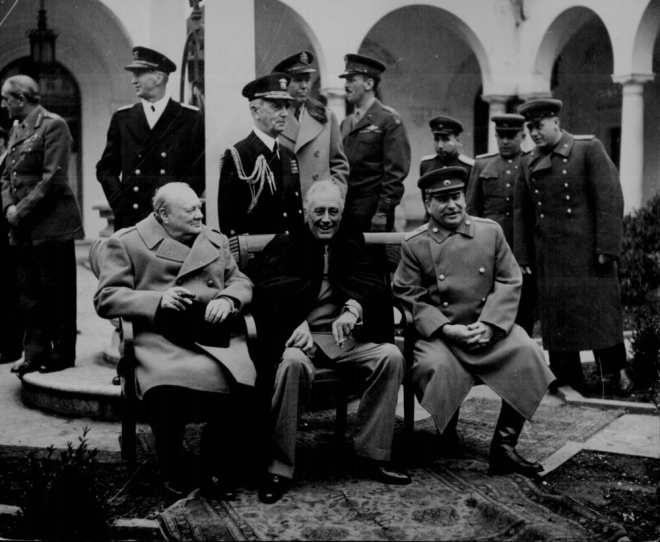
On May 8, 1945, the European theater, which had faced one of the longest and bloodiest wars the world has ever know, finally went quiet. Occurring about a week after Adolf Hitler had committed suicide, the remaining leaders of the German High Command offered unconditional surrender to representatives of the Allied Powers. This event signified the start of a dramatically different and changing global climate, but more importantly, it also allowed for relative peace to occur across Europe. This peace never could have been secured had it not been for the actions of the Soviet Union and her willingness to overcome all odds.
The on the eve of war, the Soviet Union was facing several problems that kept them from overcoming their Nazi enemy. Some of the major difficulties that the Soviet Union faced had arisen from purges in Soviet leadership, denial of the onset of war with Germany, and the lack of training provided to soldiers. All of these problems had allowed the Nazis’ the dominate the Eastern Front at the beginning of World War II.
Stalin’s Great Purge, which was the supposed arrest of treasonous individuals, ultimately resulted in the imprisonment and death of the majority of his senior military staff (Nelson). This demoralized the soldiers of the Red Army and inhibited them from receiving invaluable technical knowledge on the specifics of war. This saw the commissioning of officers that were inexperienced and lacked basic leadership skills. According to Russian historian Gregory Freeze,”… on the eve of the war, three-quarters of Soviet commanders had only been in their post for less than a year” (378). With the outbreak of war, this substandard leadership saw major loss of life on the side of the Soviet Union as well as major military defeats that could have potentially shortened the length of the entire war (Geldren).
The Soviets believed there would be time to prepare for the war; some even went as far to claim that there wouldn’t be a war at all. There was a general denial throughout the Soviet Union that they would have insufficient time to prepare, much less lose the war (Nelson). Despite the positioning of the German military along the borders of the Soviet Union, Russians weren’t simply weren’t afraid. Some sources say that they had received as many as eighty warnings of impending attack from the Germans, yet nothing was done. Even the Russian Premier, Joseph Stalin, refused to accept the fact that the Germans wished to invade his country – he even promoted a cooperative foreign policy with the Nazis. Gregory Freeze states that,”Stalin issued orders to Soviet military commanders not to shoot even if the Germans penetrated Soviet Territory so as to avoid dangerous provocations” (375). The Russians were simply not convinced that the Germans would act aggressively towards them.
Lastly, the Red Army was ill-prepared to fight off a large scale invasion, and even more so to conduct an invasion of mainland Europe themselves. During this point in time, there was no other military that could be compared in skill and prowess than that of the Germans. Even Gregory Freeze agrees that, “At the operational and tactical levels of war, the German Wehrmacht was then the finest army in the world” (376). It would take years of training and hardening to get the Red Army even close to rivaling that of the German’s Wehrmacht.
Despite all of these disadvantages, the Soviet Union was able to eventually overcome these odds and eventually secure victory. It wasn’t until the Battle of Kursk that the Russians were able to begin to turn the tide of the war. Some historians even go as far to argue that this event, not the Invasion of Normandy, was the turning point for the entire war (Geldren). Regardless, one can begin to examine the various aspects that allowed the Soviet Union to ultimately defeat the German Third Reich. Some of these major aspects include the undermining of the German war effort, the establishment of the ‘Red Steamroller’ effect, and Allied assistance.
One of the major failures of the Nazis that the Soviet Union took advantage of was the fact that Adolf Hitler was in direct control of the German army and their stratagem. The Russians had learned their lesson in World War I when Tsar Nicholas II had taken the same measures – the Soviets simply exploited the fact that Hitler was now in the same position (Nelson). Gregory Freeze claims that through this,”The Germans undermined their own war effort” (383). The Soviets also took advantage of the fact that the Nazis’ genocidal policies took away from their own war effort. “[The] Nazis’ bestial treatment… alienated them,” states James von Geldern. Furthermore, the German invasion plan was based off of inaccurate sources of intelligence rather than solid sources (i.e. Stalingrad). All of these factors helped to undermine the German war effort.
There is also the fact that the Russians were able to put the ‘Red Steamroller’ into effect. Gregory Freeze puts it best when he says that,”Simply put, the Soviets out produced the Germans” (387). He continues this conversation by also stating that,”Between 1943 and 1945, Soviet factories turned out over 73,000 tanks and self-propelled guns, 82,000 aircraft and 324,000 artillery pieces” (387). This change in productivity was the result of Stalin’s appointment of thousands of talented individuals to leadership positions and, likewise, the removal of incompetent ones. Even Stalin himself emerged as a better leader by becoming, “… a symbol of national unity, an embodiment of the spirit of resistance” (Freeze, p. 388). The increase in productivity and industrialization of the Soviet Union definitely allowed them to overcome the Germans.
Finally, Allied assistance during the war alleviated some the stresses that the Soviet Union was facing. The countries of Great Britain, the United States, and France all helped the Soviet Union in two different ways: providing economic relief and military support. Gregory Freeze states that,”Western assistance allowed the Soviet Union to keep millions of people in uniform… whom it otherwise would have had to withdraw from the front to prevent a collapse of the economy” (390). The pressure along the Western Front also took a lot of German manpower away from Russia ; rather than facing the Nazis all-in-one, they were able to work with a small majority. Without the help of the Allies, the Soviet Union may never have succeeded in World War II.
Through hard-work and dedication, the Soviet Union was able to eventually overcome the Nazis. In truth, the Russians were ill-prepared to take on such an enemy, but they overcame this challenge by undermining the German war effort, increasing production with the idea of the ‘Red Steamroller’, and relying on Allied assistance. The combination of all of these aspects allowed the war to play out until February 4, 1945 when the Winston Churchill, Franklin D. Roosevelt, and Joseph Stalin met in Yalta to discuss the conditions of Germany’s inevitable surrender (Geldren). The Soviet Union would see the end of the war once and for all.

This post was featured in the “Comrade’s Corner” section of the Soviet History Classroom Website.
Works Cited:
- Freeze, Gregory L. Russia: a History. Oxford University Press, 2009.
- Geldren, James von. “Battle of Kursk.” Seventeen Moments in Soviet History, 18 June 2017, http://soviethistory.msu.edu/1943-2/battle-of-kursk/
- Geldren, James von. “Holocaust.” Seventeen Moments in Soviet History, 18 June 2017, soviethistory.msu.edu/1943-2/holocaust/.
- Geldren, James von. “The Strange Alliance.” Seventeen Moments in Soviet History, 18 June 2017, http://soviethistory.msu.edu/1943-2/the-strange-alliance/the-strange-alliance-images/
- Nelson, Amy. “Twentieth-Century Russia.” HIST-3644. Virginia Tech, Virginia. 2018
I love your title, such a great play on words! Thank you for posting such a detailed explanation of the Soviet ill-preparedness, great for clarification and understanding!
LikeLiked by 1 person
I agree — terrific title! And I think there’s much to commend in your assessment of how the Soviets overcame their initial lack of preparedness. You’ve used evidence well to support your claims here — nicely done. I do think that Stalingrad is even more of a turning point than Kursk — or perhaps the two of them taken together. In any event, looking at the Soviet advance toward Germany in the summer of 1944 really helps put Normandy in perspective: https://en.wikipedia.org/wiki/Eastern_Front_%28World_War_II%29#/media/File:Eastern_Front_1943-08_to_1944-12.png
LikeLike
Awesome post, the title was definitely the main reason I checked it out but it was a great read through and through. Very informative and a compelling read, thanks for making this.
LikeLike
Very solid post, Austin. Everything you mention is supported by good evidence. While Hitler became more convinced of his success, the Soviet Union had the opposite happen. Stalin gradually let go of the Red Army and encouraged debate between his generals. Additionally, you brought up Allied assistance to the Soviet Union. Lend-Lease gave a lot of material to the war effort, but my favorite contribution was boots from the US. Great post!
LikeLike
An interesting post, That perfectly sums up the initial failures of the Soviet military against the Germans. I liked how it highlighted all the shortcomings of both the German and Russian sides. Do you think the Allies would have still won the war if Hitler had conquered Russia like he planned to do? Do you also believe that if the Russians had been prepared would Hitler even have attacked and if he did would the war have been over a lot quicker?
LikeLike
The Soviets won the Eastern front with shear force of will. They threw thousands upon thousands of men into the German lines until they surrendered. This is not the ideal approach but it worked so it wasn’t that bad. It shows how determined and patriotic the USSR was.
LikeLike
You did a great job explaining all the factors that led to German defeat and Soviet victory in World War 11. I like that you drew parallels between Hitler and Tsar Nicolas! I also love your title! Nice job!
LikeLike
I think it’s kind of funny that the Soviets were able to look at the past and see that the Germans strategy wouldn’t work, but the Germans totally forgot about the past failure and proceeded without thinking twice. Hindsight is 20-20 I guess
LikeLike
Nice Witty Title. I like how your post summarizes the ways that the Soviets learned from their mistakes against the German Army. It was also interesting highlighting the failures of the Soviets in their initial defensive preparedness for the German invasions
LikeLike